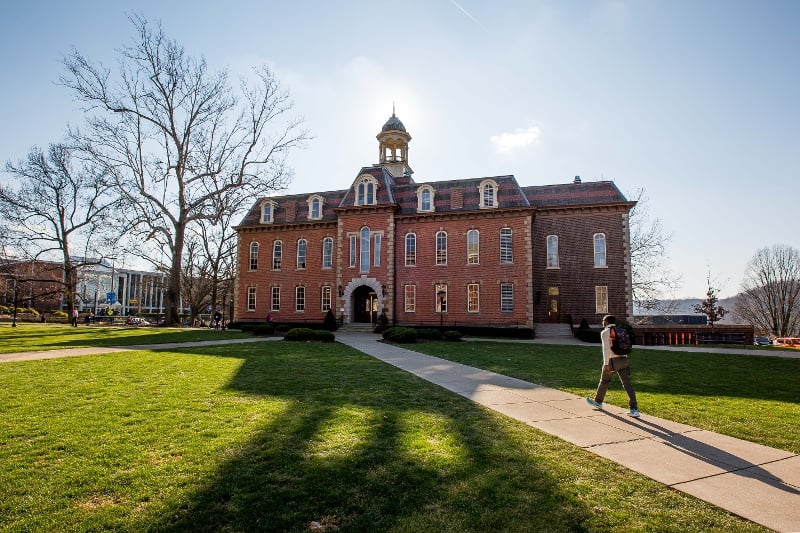
*WVU Photo/Brian Persinger
Leading research institutions, like West Virginia University, are among a select list of universities pioneering research forward at high frequencies on some of the world’s most pressing concerns, such as neuroscience, Alzheimer’s disease, the opioid crisis, and so many more challenges.
Distinguished institutions that excel in research are granted the prestigious R1 classification by the Carnegie Foundation for the Advancement of Higher Education.
West Virginia University is one of the 146 institutions in the United States that is classified as having R1 status — and WVU is the only institution in the state of West Virginia with R1 status.
WVU has maintained its R1 status since 2016, and as of February 2022, announced it has maintained its R1 status for an additional three years.
Let's talk about the benefits of research collaboration — and why West Virginia University has been classified as one of the best research institutions in the U.S.
Pioneers in research and innovation: what is an R1 institution?
Institutions awarded R1 status are renowned for conducting novel research and forming some of the brightest minds in academia. R1 institutions lead innovative research that categorizes the university as having “very high research activity."
Research-based programs can stretch across a variety of different academic disciplines, from Applied and Basic Sciences to Creative Arts and Humanities. Furthermore, such programs receive large amounts of federal and private funding to support this research, allowing research-based programs to flourish.
Why study at a Carnegie R1 institution:
Choosing to pursue a graduate degree at an R1 institution is accompanied by a plethora of benefits that will positively impact your formation as a researcher. Students studying at an R1 institution can expect to gain many real-world skills that apply to various disciplines.
At an R1 university, researchers can expect to expand their communication and critical thinking skills. Students will also learn how to effectively convey their research findings and glean meaningful solutions from them. Lastly, a researched-based graduate program at an R1 status school equips students with in-depth knowledge in some of the most relevant fields today, including technology, medicine, data science, marketing, and public health.

Below are three distinguishing features of R1 institutions (compared to R2 institutions):
1. R1 institutions graduate more doctoral students than R2 institutions.
Research conducted at the graduate level cultivates a more comprehensive knowledge base. Moreover, research-based graduate programs utilize experimental learning and expand upon research, rather than solely focusing on existing facts in the field.
While some students find that a research-based master’s degree is sufficient for their career goals, many that go on to pursue a PhD have found that conducting research at an R1 institution greatly benefitted their academic and professional path. In short, R1 institutions are recognized for graduating many more doctoral students compared to R2 schools.
2. R1 institutions receive significantly more funding than R2 institutions.
R1 institutions are awarded a significantly larger amount of funding in comparison to R2 institutions. By the end of 2020, WVU's total sponsored expenditures for research funding was $172 million, and by the end of 2021, WVU was granted $203 million in external funding for research and other sponsored programs.
For comparison, R1 institutions are required to have minimum funding of $43.8 million per academic year.
3. R1 institutions produce more accomplished researchers than R2 institutions.
Due to its significant level of research activity, R1 institutions foster more high-achieving researchers compared to R2 institutions. This is largely due to the fact that faculty at R1 institutions do not simply impart their existing knowledge to students, but rather allow graduate students to conduct hands-on research and share their findings.
This kind of tangible learning accompanied by the guidance of leading researchers forms students in advanced methodologies, equipping them with the knowledge and skills to continue building upon a growing research base
Examples of WVU’s research focus areas
Here are a few examples of research areas of focus WVU students are trailblazing:
-
Improving water quality
-
Ensuring the safety of Appalachian food systems
-
Using video games to help patients with nervous system trauma
-
Waging war on childhood obesity
-
Fighting cystic fibrosis
-
Helping lung cancer patients avoid hospital visits
Now, let's dive into three in-depth WVU achievements from 2022.
1. Neuroscience — the link between PTSD and Alzheimer's
Alzheimer’s disease’s unforgiving and sporadic progression has left researchers perplexed for decades. The very first scientific articles on Alzheimer’s disease were published in the 1960s, however, major strides have been made since researchers began investigating this type of dementia.
Top institutions are leading the charge in uncovering novel treatments and preventative measures for Alzheimer’s. Researchers at West Virginia University’s Rockefeller Neuroscience Institute were recently awarded three grants totaling $6.3 million from The National Institutes of Health to study the link between PTSD and Alzheimer’s over the next five years.
Researchers are optimistic that by simplifying learning and memory tasks, they will gain a greater insight into how memory is affected, which is typically very challenging to study as it varies in each individual.
2. Aerospace engineering — natural gas could be the key for clean hydrogen energy
More than 50 years after scientists first coined the term "hydrogen economy," the movement to make hydrogen a predominant global fuel source could be gaining traction thanks to research led by one West Virginia University engineer.
Xingbo Liu, professor in the Department of Mechanical and Aerospace Engineering, will help develop new, cutting-edge coatings for the blades of turbines used in large-scale power generation. These protective layers will be able to withstand the extreme heat and corrosion of hydrogen combustion but work with the principles and technologies of existing natural gas turbines, primarily in power plants.
The research is promising enough to have early investment from business, and if successful, could play a critical role in linking the energy industry West Virginia has to the energy industry it wants, enabling an energy revolution that's more like an evolution, where clean power builds on existing resources – in this case, the state's power generating plants and natural gas reserves.
Most of the funding for Liu’s project comes from a $2 million Department of Energy grant geared toward decarbonizing the U.S. power and industrial sectors, advancing clean energy manufacturing and improving America's economic competitiveness.
Natural gas is key to WVU engineer’s vision for clean hydrogen energy
3. Public health — the implications of sedentary behavior on pregnancy and cardiovascular health
For reasons scientists don’t fully understand, women in their 20s, 30s and 40s tend to develop cardiovascular-disease risk factors much faster than men of similar ages do.
West Virginia University epidemiologist Bethany Barone Gibbs is exploring what role adverse pregnancy outcomes — like preeclampsia and gestational diabetes — play in that disparity. She’s also exploring whether physical activity can reduce or eliminate it.
The National Heart, Lung and Blood Institute has awarded her study $3 million.
The R1 difference: make your mark on research at West Virginia University
West Virginia University is committed to forming leaders in their fields, preparing them for an array of impactful career paths. Our research-based graduate programs help students build a knowledge base that extends beyond themselves and makes a positive impact across multiple industries.
You can discover more by visiting our graduate programs page. And if you are ready to take the next step in joining one of the top research universities in the United States, you can download our Application Guide or even start your online application today.










